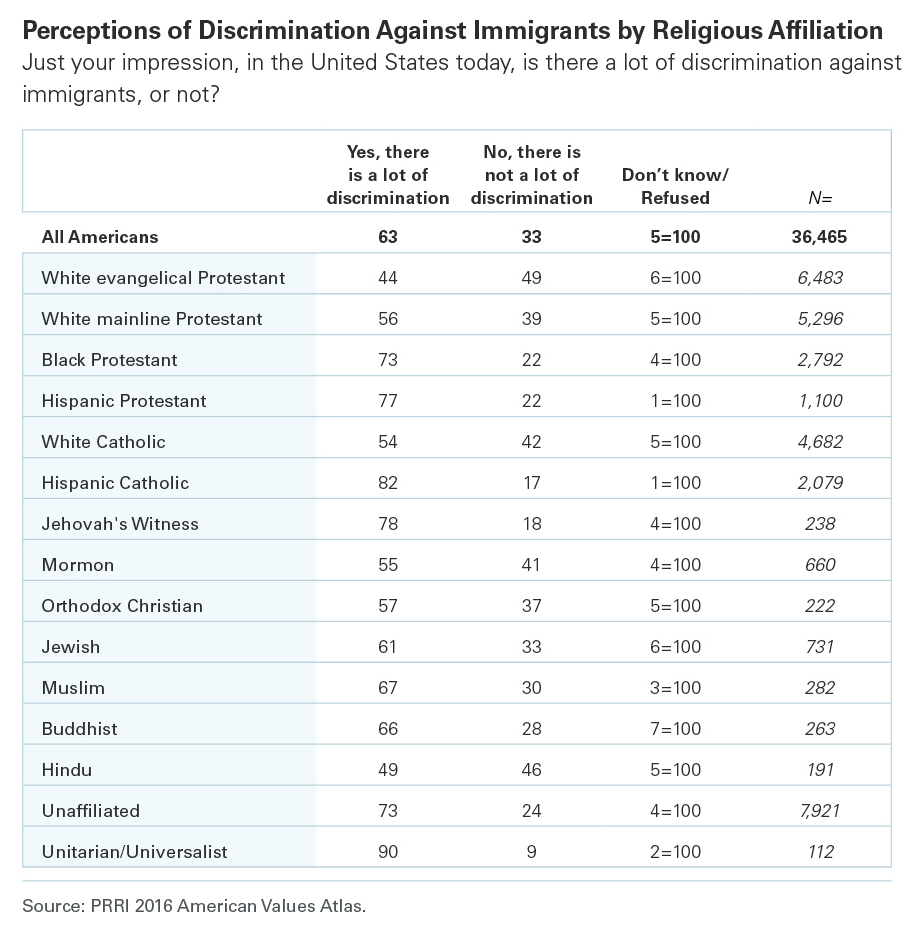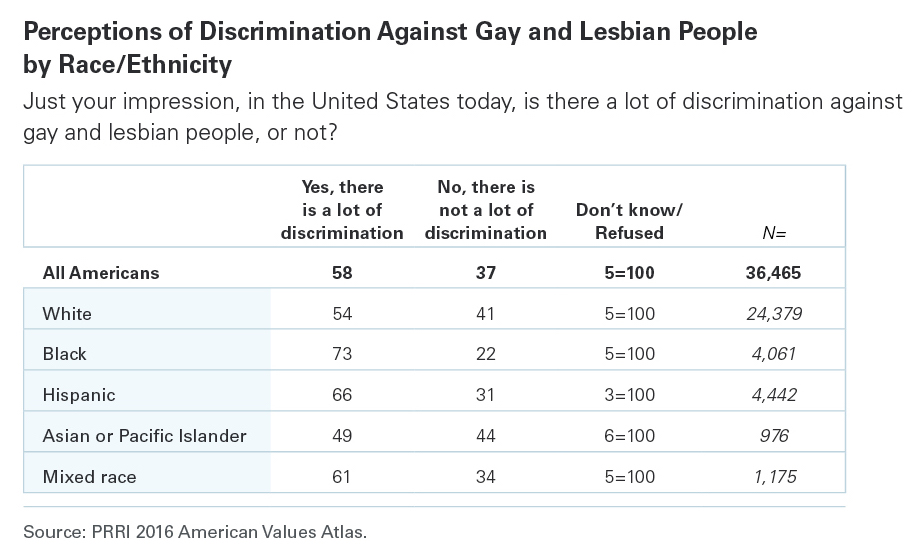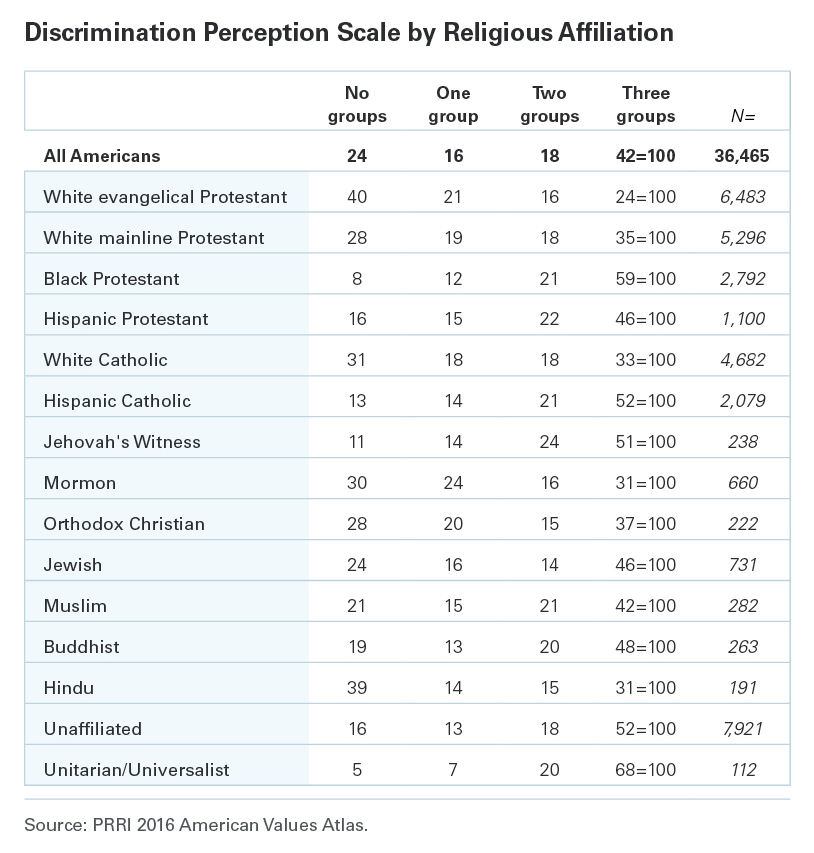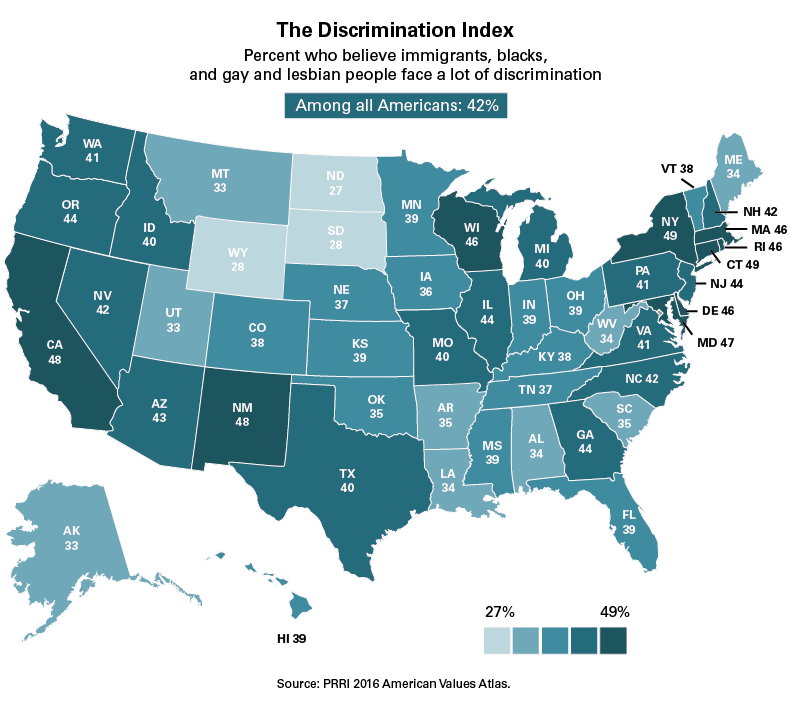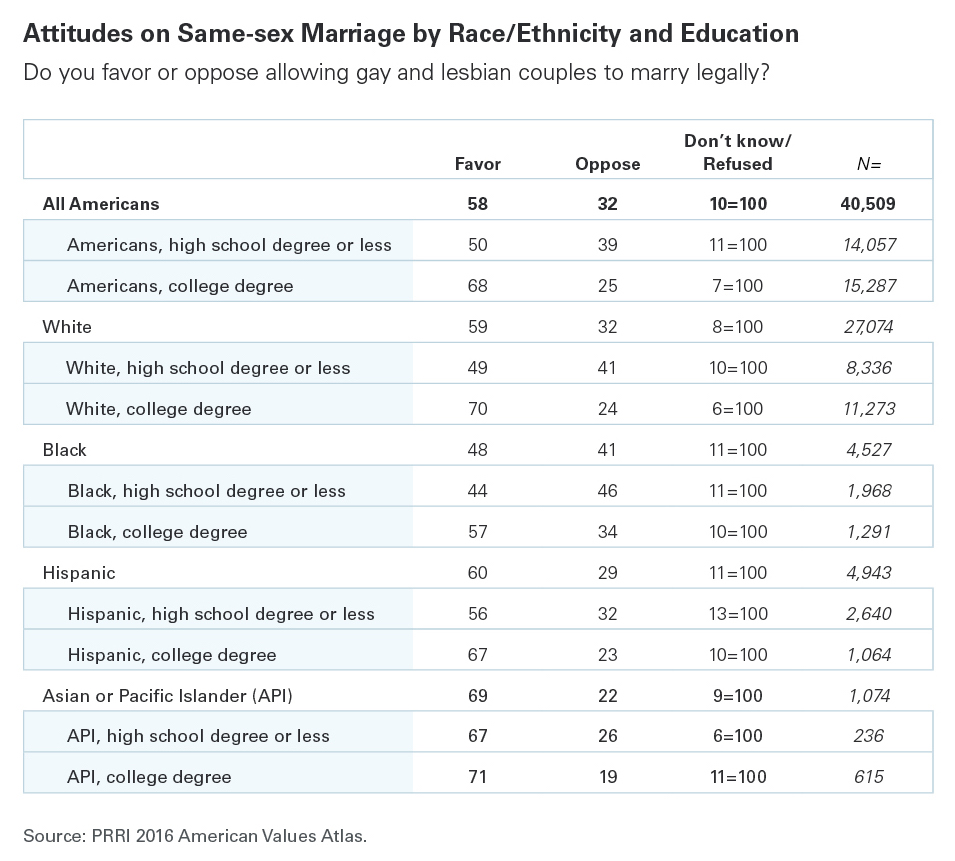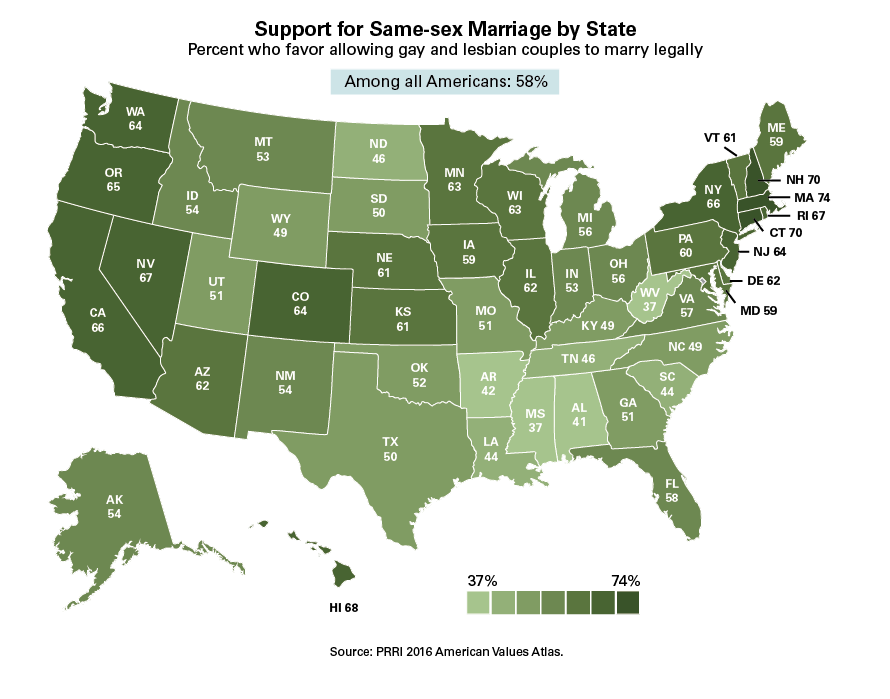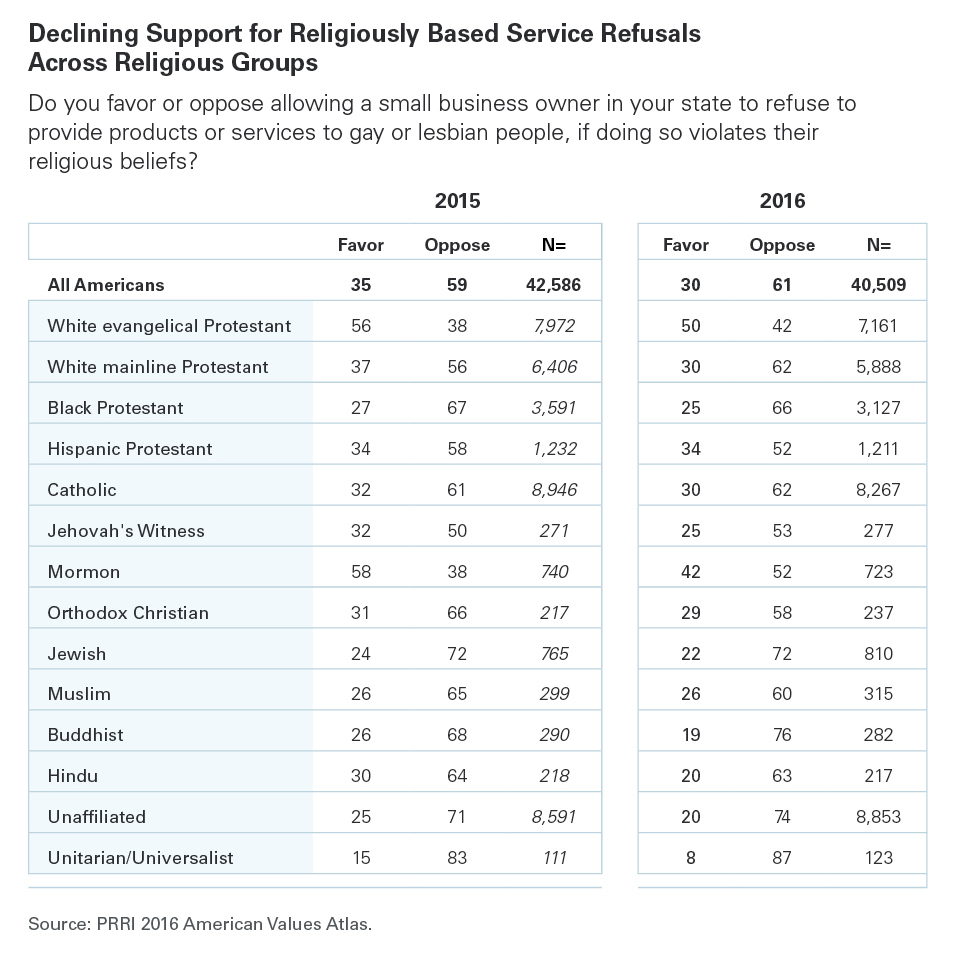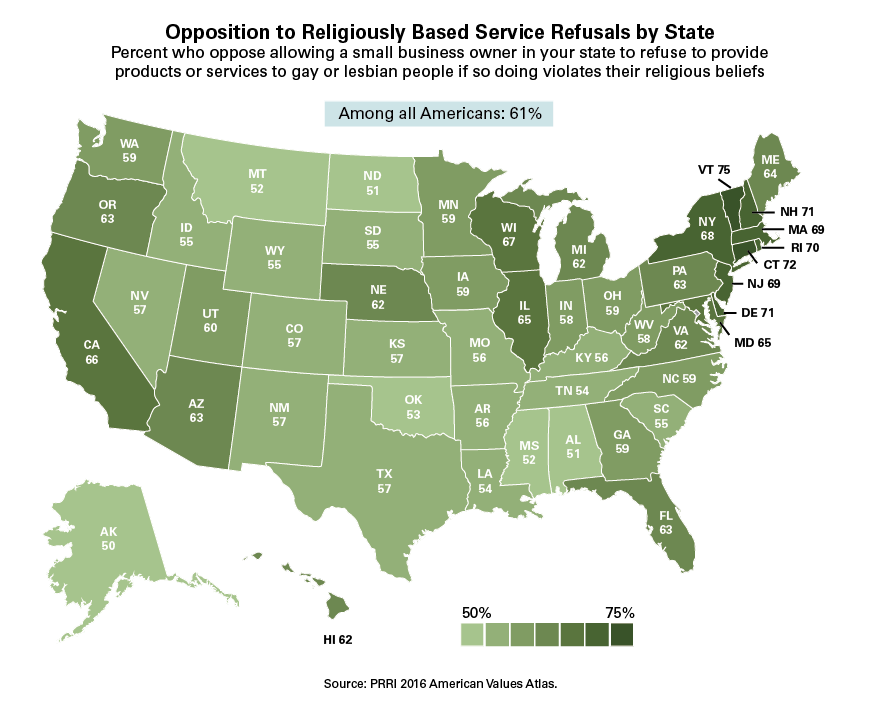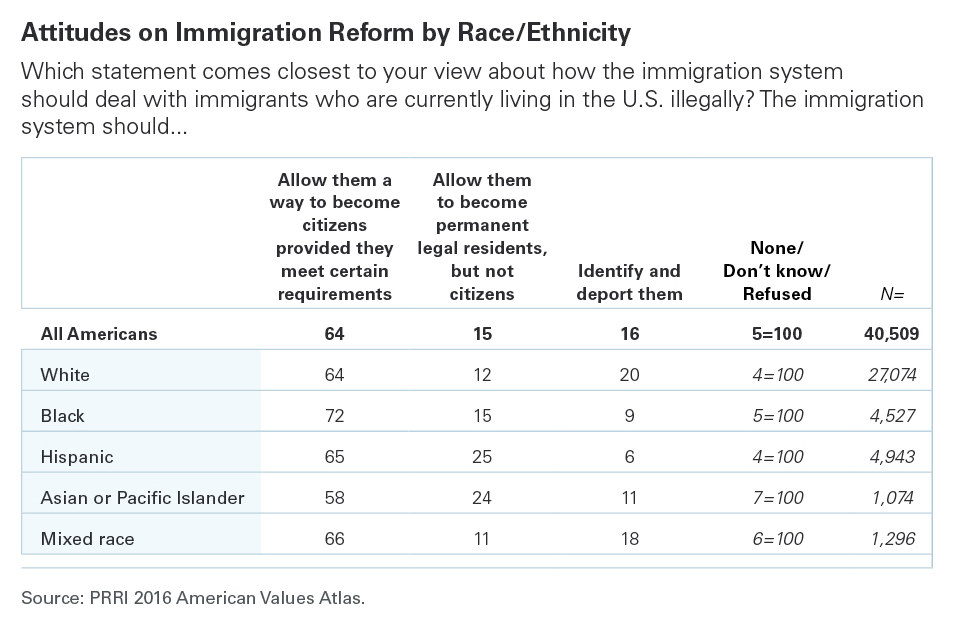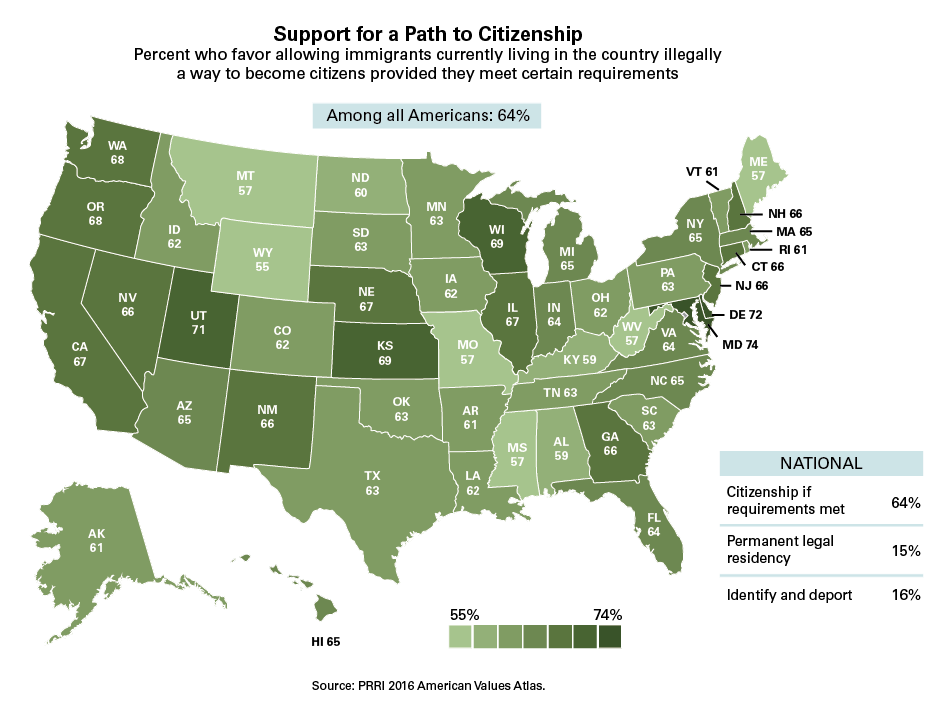Executive Summary
Perceptions of Discrimination
Most Americans believe minority groups experience a lot of discrimination in the United States today, although perceptions vary broadly by political affiliation and race. Roughly six in ten Americans believe immigrants (63%), transgender people (62%), gay and lesbian people (58%), and blacks (57%) face a lot of discrimination in the country today.
White Americans are divided on the discrimination African Americans face.
- Only half (50%) of white Americans believe blacks face a lot of discrimination, while roughly as many (47%) say this is not the case. Majorities of black Americans (85%), Hispanics (66%), mixed-race Americans (64%), and Asian-Pacific Islander (API) Americans (55%) say blacks face significant levels of discrimination today.
- However, there is considerable variation of opinion among white Americans by age. More than six in ten (63%) white young adults (age 18-29) agree blacks face a considerable amount of discrimination, while fewer than half (43%) of white seniors (age 65 or older) agree.
Republicans largely reject the idea that black Americans face a great deal of discrimination today. Fewer than one-third (32%) of Republicans believe blacks face a lot of discrimination in society, compared to roughly two-thirds (65%) who say they do not. In contrast, nearly six in ten (58%) political independents and more than three-quarters (77%) of Democrats agree blacks experience a great deal of discrimination.
Among religious Americans, white Christians are among the least likely to say gay and lesbian people currently confront a lot of discrimination in the U.S.
- Fewer than half of white evangelical Protestants (43%) and Mormons (49%)—and a slim majority of white Catholics (52%) and white mainline Protestants (54%)—say gay and lesbian people experience a great deal of discrimination.
- However, there are important generational differences. Nearly six in ten (59%) young white evangelical Protestants, but only about four in ten (43%) white evangelical Protestant seniors, say gay and lesbian people face substantial discrimination.
Black Americans are more likely than any other racial or ethnic group to perceive discrimination against gay, lesbian or transgender people.
- Nearly three-quarters of black Americans say gay and lesbian (73%) and transgender people (72%) face a lot of discrimination; roughly two-thirds of Hispanics say gay and lesbian (66%) and transgender individuals (67%) encounter discrimination; more than six in ten mixed-race Americans believe gay and lesbian (61%) and transgender people (67%) face discrimination; and a majority of white Americans perceive significant discrimination against gay and lesbian (54%) and transgender people (59%). Notably, fewer than half (49%) of Asian-Pacific Islander (API) Americans believe gay and lesbian people face a great deal of bias, while 55% of API Americans say the same of transgender people.
There are similar divisions among racial and ethnic groups on the amount of discrimination faced by immigrants, and partisan divisions remain large.
- Close to six in ten white (57%) and API Americans (59%) say immigrants face a great deal of discrimination. About two-thirds (66%) of mixed-race Americans, roughly three-quarters (74%) of black Americans, and eight in ten (80%) Hispanics also believe immigrants face a lot of discrimination.
- Only about four in ten (41%) Republicans say immigrants experience a lot discrimination in society. In contrast, roughly twice as many Democrats (78%) and nearly two-thirds (64%) of independents believe immigrants face a lot of discrimination.
According to PRRI’s Discrimination Perception Scale, nearly one-quarter (24%) of the American public do not believe any of these groups (black Americans, immigrants, or gay and lesbian people) experience a lot of discrimination, 16% believe only one of the three groups experiences a lot of discrimination, and 18% say two of the three groups face a great deal of discrimination. More than four in ten (42%) Americans say all three groups experience a lot of discrimination.
Same-sex Marriage
Roughly six in ten (58%) Americans express support for same-sex marriage today, compared to 53% in 2015, a five-point increase.
Same-sex marriage garners majority support among Americans of most racial and ethnic backgrounds, but enduring political divisions persist.
- Roughly six in ten white (59%), Hispanic (60%), and mixed-race Americans (59%) and close to seven in ten (69%) Asian-Pacific Islander (API) Americans favor same-sex marriage. Black Americans are more divided with fewer than half (48%) expressing support for allowing gay and lesbian couples to marry, while 41% are opposed. However, this represents a five-point increase in support for same-sex marriage, compared to 43% in 2015.
- More than seven in ten (71%) Democrats and roughly six in ten (62%) independents favor same-sex marriage. In contrast, only 38% of Republicans favor same-sex marriage, while a majority (52%) oppose it. One year earlier, 34% of Republicans favored same-sex marriage and nearly six in ten (59%) said they opposed it.
- Views among Republicans are fracturing along generational lines. A majority (54%) of young Republicans (ages 18-29) favor allowing gay and lesbian couples to marry, while fewer than three in ten (27%) Republican seniors agree.
Most religious groups in the U.S. now support same-sex marriage.
- A majority of white mainline Protestants (63%), Catholics (62%), and Orthodox Christians (59%) favor same-sex marriage. At least two-thirds of Hindus (67%), Jews (73%), the religiously unaffiliated (78%), and Buddhists (85%) favor same-sex marriage. Equal numbers of black Protestants favor (45%) and oppose (45%) same-sex marriage. Similarly, Muslims (44% vs. 41%, respectively) and Hispanic Protestants (41% vs. 46%, respectively) are about as likely to support same-sex marriage as oppose it.
- There are only three major religious groups among whom a majority oppose same-sex marriage: Jehovah’s Witnesses (53% oppose vs. 25% support), Mormons (55% oppose vs. 37% support), and white evangelical Protestants (61% oppose vs. 31% support). Together, these three religious groups comprise only 19 percent of the general public.
- No religious group has experienced a more dramatic shift in views on same-sex marriage than white mainline Protestants. Currently, 63% of white mainline Protestants support same-sex marriage, a 27-point increase from 2003 when only about one-third (36%) expressed support for the policy.
With the exception of West Virginia (37% support), support for same-sex marriage is lowest across the deep South.
Only 37% of Mississippi residents say gay and lesbian people should be allowed to marry legally, while roughly four in ten Americans living in Alabama (41%), Arkansas (42%), South Carolina (44%), and Louisiana (44%) say the same.
Religiously Based Service Refusals
More than six in ten (61%) Americans oppose allowing small business owners to refuse to provide products or services to gay or lesbian people, if doing so would violate their religious beliefs. Three in ten (30%) Americans favor this policy.
There is no religious group in which a majority favors allowing small business owners to refuse services to gay and lesbian people.
- Only half (50%) of white evangelical Protestants and fewer than half of Mormons (42%), Hispanic Protestants (34%), black Protestants (25%), and Jehovah’s Witnesses (25%) believe small business owners should be granted permission to refuse services to gay and lesbian people.
Majorities of all racial and ethnic groups oppose religiously based service refusals. Opposition to religiously based service refusals has increased among white Americans between 2015 and 2016.
- At least six in ten white (60%), Hispanic (62%), API (65%), and black Americans (68%) oppose a policy that would allow small businesses to refuse services to gay and lesbian people.
In 2015, white Americans (55%) were somewhat less likely than Hispanic (66%) and black Americans (67%) to oppose religiously based service refusals.
Immigration Reform
Today, nearly two-thirds (64%) of Americans say the immigration system should allow immigrants currently living in the country illegally to become citizens provided they meet certain requirements; 15% prefer allowing immigrants living in the country illegally to become permanent legal residents but not citizens; and another 16% say these immigrants should be identified and deported. These numbers have remained largely unchanged since 2013.
Notably, majorities of Democrats and Republicans prefer a path to citizenship for immigrants living in the U.S. illegally.
- Three-quarters (75%) of Democrats say immigrants living in the country illegally should be granted a path to citizenship if they meet certain requirements, while a majority (55%) of Republicans say the same. Permanent legal residency is supported by relatively few Democrats (15%) and Republicans (13%), while deportation is a significantly more popular policy among Republicans (28%) than among Democrats (8%).
Majorities of every state support a path to citizenship for immigrants living in the country illegally. States with the lowest—but still majority—support for a path to citizenship tend to be clustered in the South and Midwest.
Nearly six in ten residents of Maine (57%), Mississippi (57%), Missouri (57%), Montana (57%), and West Virginia (57%) favor a policy offering citizenship. Even in Wyoming—the state with the lowest support for a path to citizenship for illegal immigrants—a majority (55%) of residents still support such a policy while fewer than one in three (32%) residents say illegal immigrants living in the U.S. should be identified and deported.
I. Discrimination
Discrimination in America
Most Americans believe minority groups experience a lot of discrimination in the United States today, although perceptions vary broadly by political affiliation and race. Roughly six in ten Americans believe immigrants (63%), transgender people (62%), gay and lesbian people (58%), and blacks (57%) face a lot of discrimination in the country today.
In contrast, fewer than four in ten Americans say blacks (39%), gay and lesbian people (37%), immigrants (33%), and transgender people (29%) do not experience significant discrimination in the U.S.
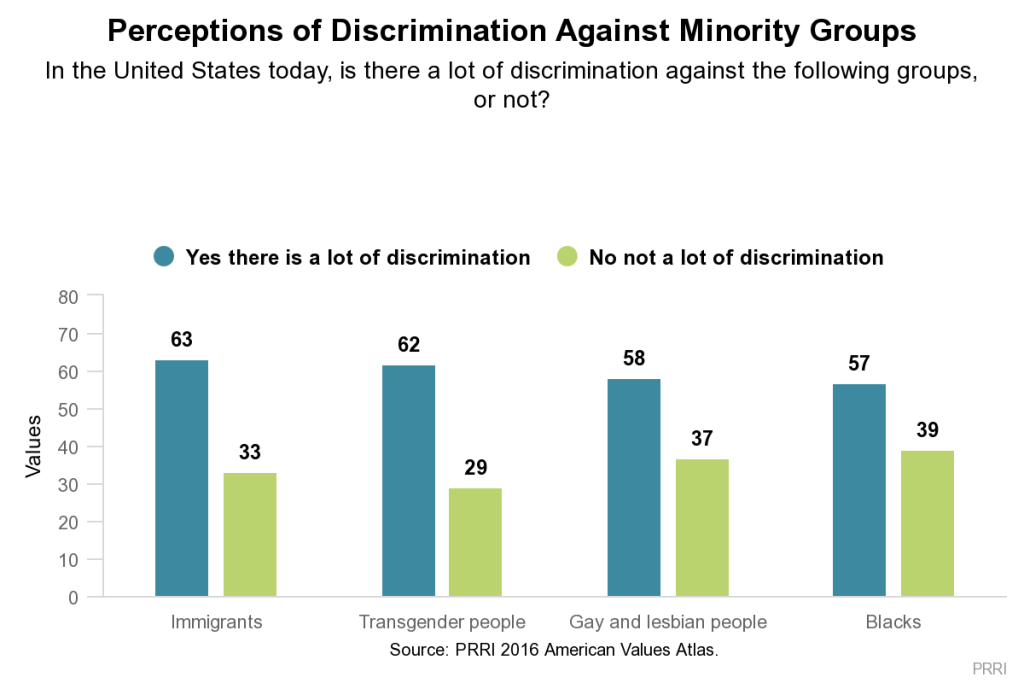 Discrimination Against Black Americans
Discrimination Against Black Americans
Views about the prevalence of discrimination against black Americans in the U.S. vary considerably by racial and ethnic background. Only half (50%) of white Americans believe blacks face a lot of discrimination, while roughly as many (47%) say this is not the case. In contrast, a majority of nonwhite Americans believe blacks confront a great deal of discrimination including more than eight in ten (85%) blacks, and roughly two-thirds of Hispanic (66%) and mixed-race Americans (64%). A majority (55%) of Asian-Pacific Islanders (API) also believe blacks experience a great deal of discrimination, although nearly four in ten (38%) disagree.
Among white Americans, perceptions of discrimination differ starkly by age and education and more modestly by gender. More than six in ten (63%) white young adults (age 18-29) agree blacks face a considerable amount of discrimination, while fewer than half (43%) of white seniors (age 65 or older) agree. A similar gap is evident among whites by education. A majority (58%) of white college graduates—including 61% of whites with a post-graduate education—believe blacks experience a lot of discrimination in society, compared to fewer than half (44%) of whites with a high school degree or less. White women are significantly more likely than white men to say blacks experience a lot of discrimination (54% vs. 46%, respectively).
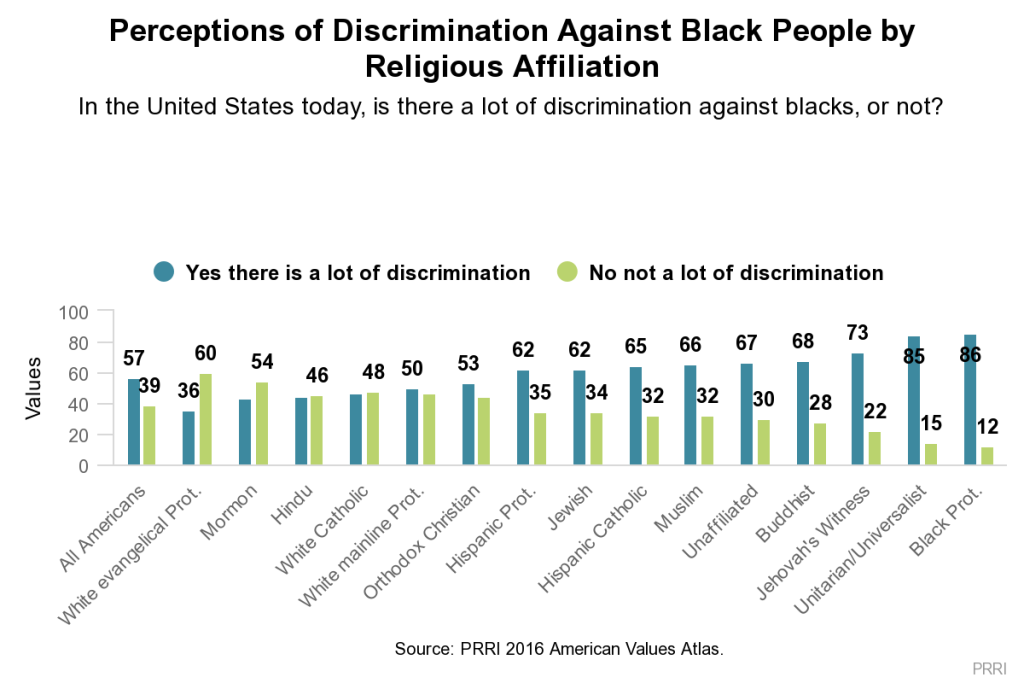 Americans across the religious spectrum are also largely divided by race in their views on discrimination against blacks. White Christians are generally less likely than other religious groups and the religiously unaffiliated to say that blacks experience significant discrimination. Only slightly more than one-third (36%) of white evangelical Protestants believe there is a lot of discrimination against blacks in the U.S. today, while six in ten (60%) disagree. About four in ten (43%) Mormons and roughly half of white mainline Protestants (50%) and white Catholics (47%) perceive blacks facing substantial discrimination.1 In contrast, more than six in ten Hispanic Protestants (62%) and Hispanic Catholics (65%), and close to nine in ten black Protestants (86%) say black Americans confront a great deal of discrimination in the U.S.
Americans across the religious spectrum are also largely divided by race in their views on discrimination against blacks. White Christians are generally less likely than other religious groups and the religiously unaffiliated to say that blacks experience significant discrimination. Only slightly more than one-third (36%) of white evangelical Protestants believe there is a lot of discrimination against blacks in the U.S. today, while six in ten (60%) disagree. About four in ten (43%) Mormons and roughly half of white mainline Protestants (50%) and white Catholics (47%) perceive blacks facing substantial discrimination.1 In contrast, more than six in ten Hispanic Protestants (62%) and Hispanic Catholics (65%), and close to nine in ten black Protestants (86%) say black Americans confront a great deal of discrimination in the U.S.
With one important exception, non-Christian groups largely agree black Americans experience a lot of discrimination. More than six in ten Jews (62%), Muslims (66%), religiously unaffiliated Americans (67%), and Buddhists (68%) agree blacks confront a lot of discrimination. Notably, Hindus are divided, with fewer than half (45%) expressing the view that blacks face a lot of discrimination while roughly as many (46%) disagree. Eighty-five percent of Unitarian Universalists say blacks experience a lot of discrimination.
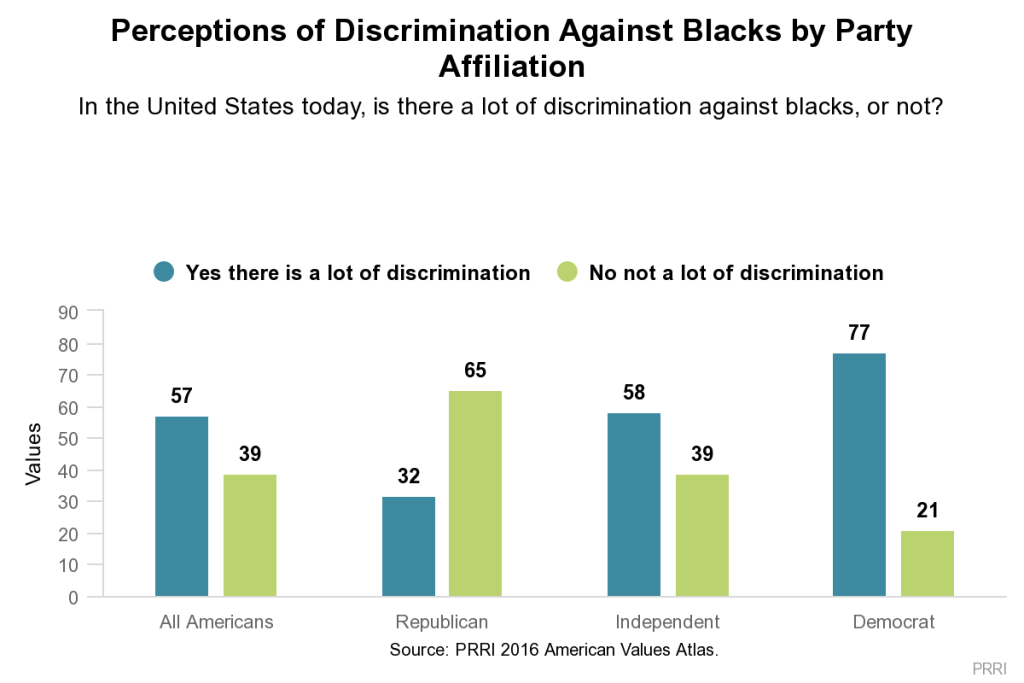 Views are also strongly influenced by political affiliation. Fewer than one-third (32%) of Republicans believe black Americans face a lot of discrimination in society, while roughly two-thirds (65%) say they do not. In contrast, nearly six in ten (58%) political independents and more than three-quarters (77%) of Democrats agree blacks experience a great deal of discrimination. The views of white Democrats are similar to Democrats overall, with roughly three-quarters (74%) of white Democrats expressing the view that blacks face a lot of discrimination.
Views are also strongly influenced by political affiliation. Fewer than one-third (32%) of Republicans believe black Americans face a lot of discrimination in society, while roughly two-thirds (65%) say they do not. In contrast, nearly six in ten (58%) political independents and more than three-quarters (77%) of Democrats agree blacks experience a great deal of discrimination. The views of white Democrats are similar to Democrats overall, with roughly three-quarters (74%) of white Democrats expressing the view that blacks face a lot of discrimination.
Americans who identify as lesbian, gay, bisexual, or transgender (LGBT) are substantially more likely than heterosexual Americans to say black people in the U.S. are experiencing a lot of discrimination (78% vs. 56%, respectively).
Differences in perceptions of discrimination are muted across regions. A majority of Americans in every region believe blacks face a considerable amount of discrimination, including more than six in ten (62%) Americans in the Northeast, and majorities of those living in the Midwest (55%), South (55%), and West (58%). There are greater doubts among whites on whether black people face discrimination, although variation between regions remains somewhat modest. A majority of whites living in the Northeast (55%) and West (52%) say blacks face a lot of discrimination, as do half (50%) of whites in the Midwest. Fewer than half (45%) of white Southerners say the same.
Notably, perceptions of discrimination against blacks among white Republicans are fairly stable across the U.S., while the views of white Democrats vary considerably. Only about one in three (31%) white Republicans in the New England believe blacks face a lot of discrimination, roughly similar to those in Pacific region (30%), mountain region (29%), and East South Central U.S. (28%), which includes Alabama, Kentucky, Mississippi, and Tennessee. In contrast, white Democrats in New England (80%) and the Pacific region (82%) are substantially more likely than those in the East South Central region (60%) to believe that blacks experience a great amount of discrimination.2
In no part of the country are there more doubts about the existence of discrimination against blacks than the states located in the upper Midwest and mountain region. Only about four in ten Americans living in North Dakota (40%), Wyoming (41%), Montana (42%), and South Dakota (43%) believe blacks experience a great deal of discrimination.3 However, it is notable that whites in southern states also express considerable doubts. Roughly four in ten white Americans living in the Deep South—including residents of Alabama (38%), Louisiana (36%), Mississippi (40%), and South Carolina (40%)—say black Americans experience a lot of discrimination.
Discrimination Against Immigrants
There is greater consensus among racial and ethnic groups on the amount of discrimination faced by immigrants. Close to six in ten white (57%) and API Americans (59%) say immigrants face a great deal of discrimination. About two-thirds (66%) of mixed-race Americans, roughly three-quarters (74%) of black Americans, and eight in ten (80%) Hispanics also believe immigrants face a lot of discrimination.
Compared to views about discrimination against blacks, the generational divisions among whites in views of immigrants are even more pronounced. Nearly three-quarters (74%) of young white Americans believe immigrants face a lot of discrimination, while fewer than half (47%) of white seniors agree. A similar share (45%) of white seniors do not believe immigrants experience a lot of discrimination. There is also a sizable gender gap: White women are significantly more likely to perceive discrimination against immigrants than white men (62% vs. 51%, respectively).
A similar pattern emerges among religious groups in perceptions of discrimination against immigrants. White Christians express more skepticism about discrimination than other religious groups, with white evangelical Protestants most likely to believe discrimination is not an issue. Fewer than half (44%) of white evangelical Protestants say immigrants face a lot of discrimination in American society, while majorities of white Catholics (54%), Mormons (55%), and white mainline Protestants (56%) say this group does face a considerable degree of discrimination. More than seven in ten black Protestants (73%), Hispanic Protestants (77%), and Hispanic Catholics (82%) believe immigrants experience a lot of discrimination in the U.S.
With the exception of Hindus, there is widespread agreement among non-Christian groups that immigrants face a great deal of discrimination. More than six in ten Jews (61%), Buddhists (66%), Muslims (67%), and religiously unaffiliated Americans (73%) perceive immigrants experiencing a lot of discrimination. Hindus are divided with roughly equal numbers reporting that immigrants do face discrimination as they do not (49% vs. 46%, respectively). Unitarian Universalists are unique in the degree to which they perceive discrimination against immigrants—90% say they face a lot.
There are sharp partisan differences in views about discrimination against immigrants. Only about four in ten (41%) Republicans say immigrants experience a lot discrimination in society. In contrast, roughly twice as many Democrats (78%) and nearly two-thirds (64%) of independents believe immigrants face a lot of discrimination. However, Republicans are divided by generation. Six in ten (60%) Republican young adults (age 18-29) believe immigrants face a lot of discrimination, a view shared by only one-third (33%) of Republican seniors (age 65 or older). Importantly, the generational pattern is not linear. While Republicans under the age of 40 demonstrate distinctly different views about discrimination against immigrants, there is little difference in the views of Republicans in their 40s from those in their 50s, 60s, or 70s.
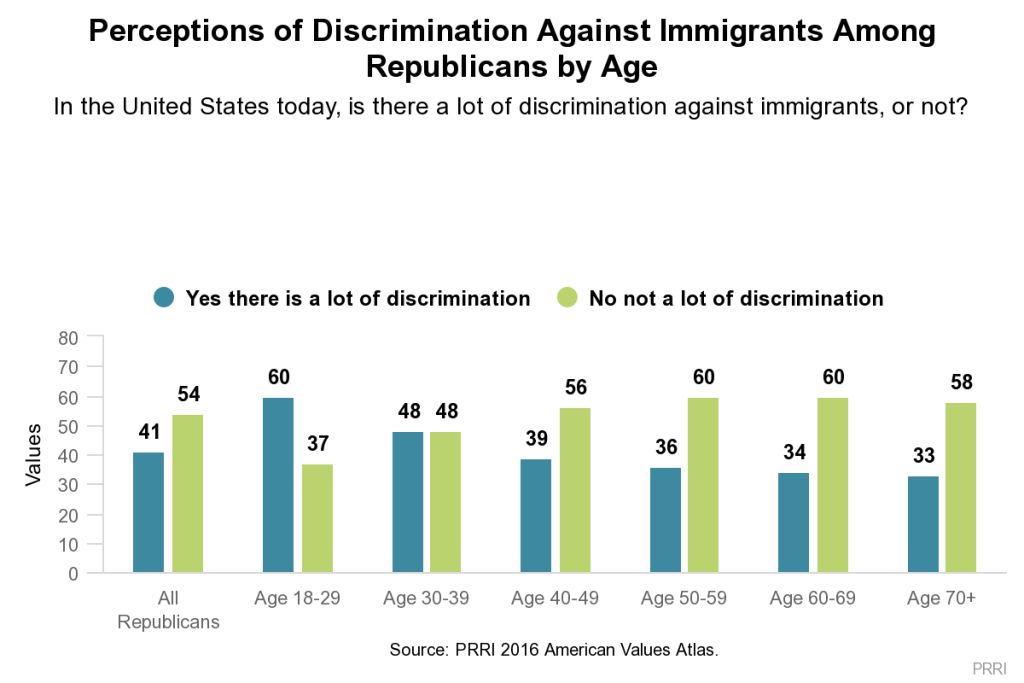 There is a similarly-sized gap between LGBT and straight Americans in perceptions of discrimination against immigrants. More than eight in ten (83%) LGBT Americans believe immigrants experience a lot of discrimination in the U.S., a view shared by approximately six in ten (61%) straight Americans.
There is a similarly-sized gap between LGBT and straight Americans in perceptions of discrimination against immigrants. More than eight in ten (83%) LGBT Americans believe immigrants experience a lot of discrimination in the U.S., a view shared by approximately six in ten (61%) straight Americans.
There is no clear regional pattern in perceptions of discrimination against immigrants. At least six in ten Americans in the Midwest (60%), South (61%), West (65%), and Northeast (65%) say immigrants experience a lot of discrimination. The states whose residents express the most doubts about discrimination against immigrants include North Dakota (49%), Montana (51%), and Alaska (51%).
Discrimination Against Gay, Lesbian, and Transgender People
No racial or ethnic group is more likely to perceive discrimination against gay, lesbian or transgender people than black Americans. Despite expressing ambivalent attitudes about the legality of same-sex marriage, nearly three-quarters (73%) of black Americans say gay and lesbian people face a lot of discrimination. A majority (54%) of white Americans and more than six in ten Hispanics (66%) and mixed-race Americans (61%) also say gay and lesbian people experience a lot of discrimination. Notably, fewer than half (49%) of API Americans believe gay and lesbian people face a great deal of discrimination. There is somewhat more agreement about the discrimination experienced by transgender people—a majority of API (55%), white (59%), Hispanic (67%), mixed-race (67%), and black Americans (72%) say there is a lot of discrimination against transgender people.
Perceptions are also conditioned by age. Two-thirds (67%) of young adults but only about half (51%) of seniors believe gay and lesbian people experience a lot of discrimination. Similarly, while close to three-quarters (73%) of young people say transgender people face a great deal of discrimination, roughly half (51%) of seniors agree.
As is the case with perceptions of discrimination against blacks and immigrants, white Christians are generally least likely to say gay, lesbian, and transgender people confront a lot of discrimination in the U.S. Fewer than half of white evangelical Protestants (43%) and Mormons (49%), and a slim majority of white Catholics (52%) and white mainline Protestants (54%), say gay and lesbian people experience a great deal of discrimination. Close to half (47%) of white evangelical Protestants and a majority of Mormons (53%), white Catholics (57%), and white mainline Protestants (60%) say transgender people face a lot of discrimination.
The generational divergence in perceptions is also apparent among religious groups. Nearly six in ten (59%) young white evangelical Protestants say gay and lesbian people face substantial discrimination. In contrast, roughly four in ten (43%) white evangelical Protestant seniors say gay and lesbian people face a lot of discrimination.
Despite divisions over same-sex marriage, a majority of black Protestants (73%) and Hispanic Protestants (59%) say gay and lesbian people experience a lot of discrimination in society. Two-thirds (67%) of Hispanic Catholics also believe gay and lesbian people face a lot of discrimination. Similar agreement exists in views about the discrimination experienced by transgender people. More than six in ten Hispanic Protestants (63%), Hispanic Catholics (67%), and black Protestants (71%) believe transgender people face a lot of discrimination in the U.S.
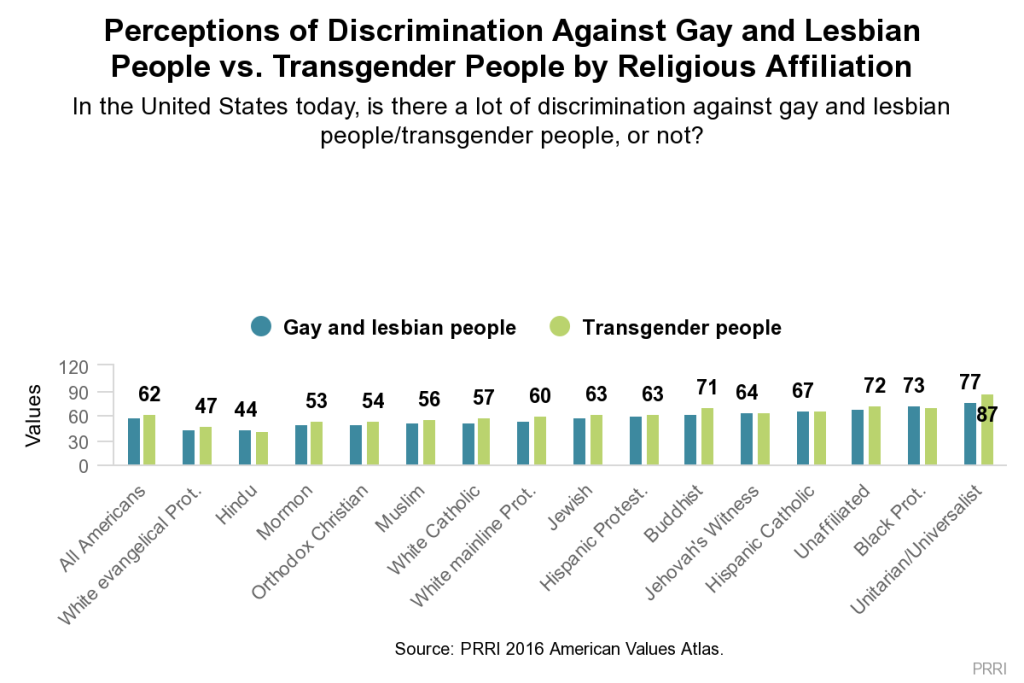 The views of non-Christian groups vary widely. Roughly six in ten Jews (58%) and Buddhists 62%), and about two-thirds (68%) of religiously unaffiliated Americans, say gay and lesbian people confront a considerable amount of discrimination. Substantially fewer Muslims (51%) and Hindus (44%) agree. A majority of non-Christian groups—with the exception of Hindus—perceive transgender people as facing a lot of discrimination, including Muslims (56%), Jews (63%), Buddhists (71%), and religiously unaffiliated Americans (72%). Only about four in ten (41%) Hindus believe transgender people face a lot of discrimination while just about as many (42%) disagree. Nearly one in five (17%) Hindus offer no opinion. No religious group is more likely to say gay and lesbian people (77%) and transgender people (87%) experience a great deal of discrimination than Unitarian Universalists.
The views of non-Christian groups vary widely. Roughly six in ten Jews (58%) and Buddhists 62%), and about two-thirds (68%) of religiously unaffiliated Americans, say gay and lesbian people confront a considerable amount of discrimination. Substantially fewer Muslims (51%) and Hindus (44%) agree. A majority of non-Christian groups—with the exception of Hindus—perceive transgender people as facing a lot of discrimination, including Muslims (56%), Jews (63%), Buddhists (71%), and religiously unaffiliated Americans (72%). Only about four in ten (41%) Hindus believe transgender people face a lot of discrimination while just about as many (42%) disagree. Nearly one in five (17%) Hindus offer no opinion. No religious group is more likely to say gay and lesbian people (77%) and transgender people (87%) experience a great deal of discrimination than Unitarian Universalists.
There is also a substantial gender gap in these views. More than six in ten (64%) women say gay and lesbian people experience a great deal of discrimination, compared to roughly half (52%) of men. A similar pattern is evident in views of transgender people with women 12 percentage points more likely than men to say this group faces a lot of discrimination (67% vs. 55%, respectively).
Republicans are far less likely than Democrats to perceive discrimination against gay and lesbian people (38% vs. 75%, respectively) or transgender people (44% vs. 77%, respectively). Roughly six in ten independents say gay and lesbian people (59%) and transgender people (62%) experience a great deal of discrimination in the U.S.
However, views of Republicans are strongly influenced by age. Half (50%) of Republicans under the age of 30 believe gay and lesbian people experience a lot of discrimination, a view shared by only about one-third (36%) of Republican seniors. Similarly, roughly six in ten (58%) young Republicans believe transgender people face discrimination while fewer than four in ten (38%) Republican seniors agree.
Roughly eight in ten LGBT Americans believe gay and lesbian people (79%) and transgender people (83%) confront a significant amount of discrimination in society. Substantially fewer straight Americans agree gay and lesbian people (57%) and transgender people (61%) are experiencing a lot of discrimination. Notably, the perceptions of LGBT Americans differ somewhat by age. Young adults who identify as LGBT are more likely than LGBT seniors to say gay and lesbian people experience a lot of discrimination (81% vs. 63%, respectively).
Americans who live in the upper Midwest and Mountain West are generally more likely than those who live in other parts of the country to doubt the degree of discrimination faced by gay and lesbian people. Roughly half of Americans in North Dakota (47%), South Dakota (47%), and Montana (49%) say gay and lesbian people experience a lot of discrimination in the U.S. Notably, fewer than half of Americans who live in Hawaii (49%) and Alaska (46%) also say gay and lesbian people experience a lot of discrimination in the U.S.
Americans living in the Northeast are among the most likely to believe gay and lesbian people face a lot of discrimination. More than six in ten Americans living in Rhode Island (66%), Vermont (66%), and New York (64%) perceive a lot of discrimination against gay and lesbian people.
Majorities of Americans in every state say transgender people face a lot of discrimination, although residents of Montana (51%), Louisiana (53%), and North Dakota (53%) are the least likely to agree with this sentiment. For a complete state-by-state look, visit ava.prri.org.
Discrimination Perception Scale
Perceptions of discrimination against minority groups are significantly correlated—Americans who say one group faces discrimination are more likely to agree others do as well. In an effort to provide an overall view of discrimination, we developed an additive scale combining perceptions of discrimination against blacks, immigrants, and gay and lesbian people.4 The final scale includes four categories: no group faces discrimination; one of three groups faces discrimination; two of three groups face discrimination; and all three groups face discrimination.
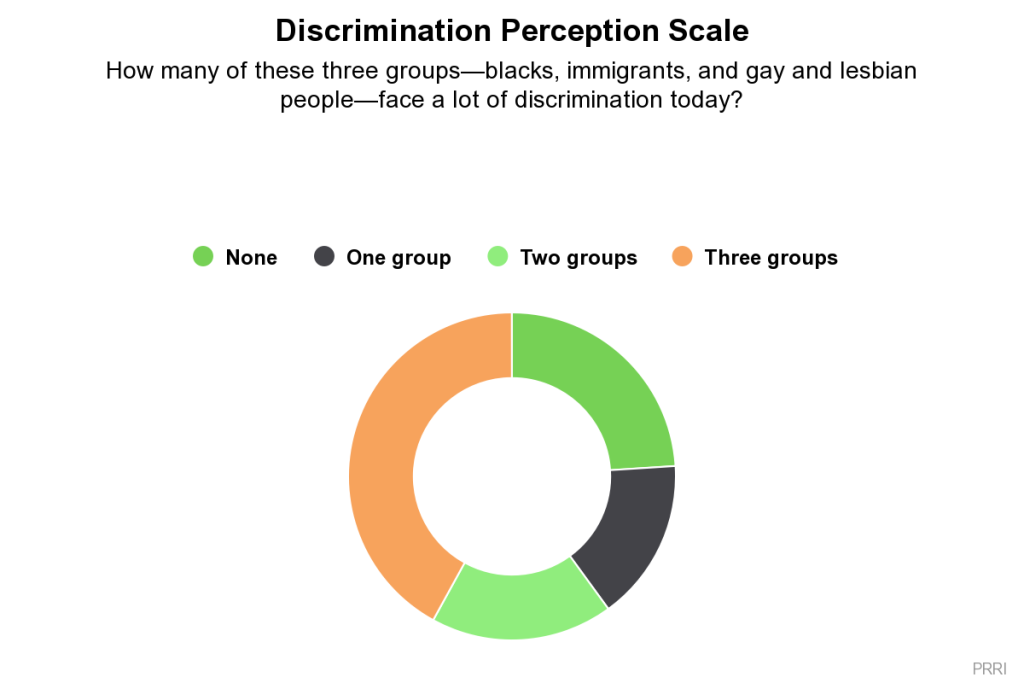 The Discrimination Perception Scale finds nearly one-quarter (24%) of the American public do not believe any of these groups experience a lot of discrimination, 16% believe only one of the three groups experiences a lot of discrimination, and 18% say two of the three groups face a great deal of discrimination. More than four in ten (42%) Americans say all three groups experience a lot of discrimination. American views about discrimination differ sharply by race and ethnicity, gender, age, and political affiliation.
The Discrimination Perception Scale finds nearly one-quarter (24%) of the American public do not believe any of these groups experience a lot of discrimination, 16% believe only one of the three groups experiences a lot of discrimination, and 18% say two of the three groups face a great deal of discrimination. More than four in ten (42%) Americans say all three groups experience a lot of discrimination. American views about discrimination differ sharply by race and ethnicity, gender, age, and political affiliation.
White and API Americans are substantially less likely than black and Hispanic Americans to perceive discrimination in general. Nearly three in ten white (29%) and API Americans (28%) believe none of these groups experience a lot of discrimination, a view shared by only eight percent of blacks and 13% of Hispanics. A majority of black (60%) and Hispanic Americans (52%) believe all of these groups face a lot of discrimination. Approximately half (48%) of mixed-race Americans also believe that all three groups experiences substantial discrimination.
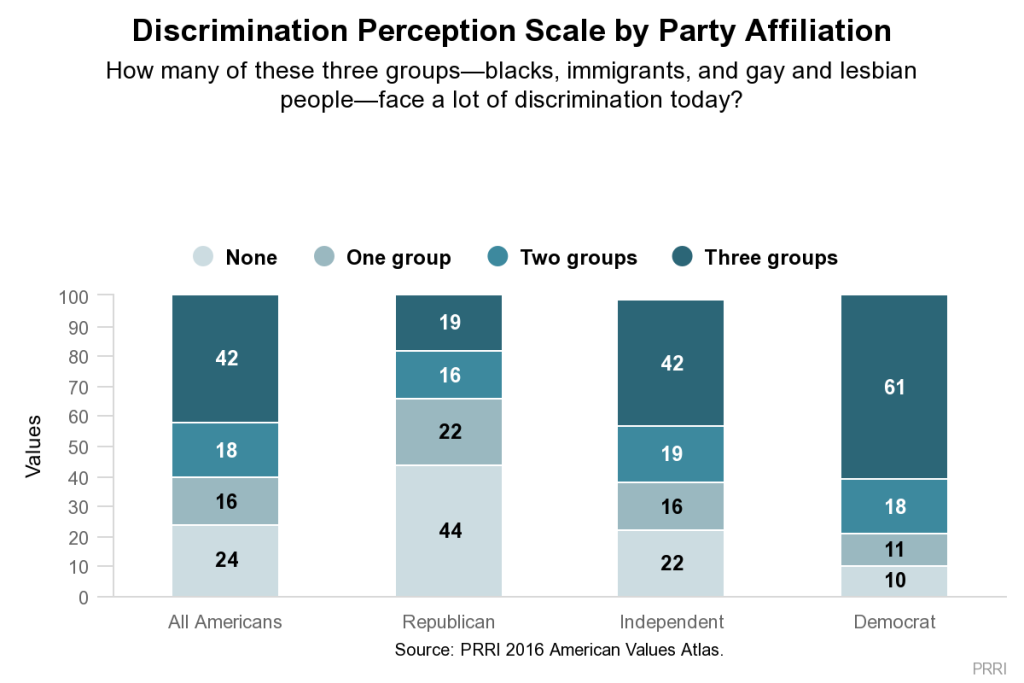 Republicans (44%) are twice as likely as independents (22%) and more than four times as likely as Democrats (10%) to say none of the three groups face a great deal of discrimination. Conversely, more than six in ten (61%) Democrats believe all three groups—immigrants, blacks, and gay and lesbian people—experience a lot of discrimination, while fewer than one in five (19%) Republicans agree.
Republicans (44%) are twice as likely as independents (22%) and more than four times as likely as Democrats (10%) to say none of the three groups face a great deal of discrimination. Conversely, more than six in ten (61%) Democrats believe all three groups—immigrants, blacks, and gay and lesbian people—experience a lot of discrimination, while fewer than one in five (19%) Republicans agree.
Among partisans there are stark generational divisions. Nearly half (47%) of Republican seniors believe none of the three groups experience discrimination, a view shared by fewer than three in ten (28%) Republican young adults. Similarly, more than seven in ten (71%) Democratic young adults believe these groups all face discrimination compared to half (50%) of Democratic seniors.
In general, white Christians are more likely than other religious groups to say none of these groups experience a lot of discrimination. Four in ten (40%) white evangelical Protestants and roughly three in ten white mainline Protestants (28%), Mormons (30%), and white Catholics (31%) also say none of these groups contends with significant discrimination in the U.S.
In contrast, relatively few black Protestants (8%), Hispanic Protestants (16%), and Hispanic Catholics (13%) believe none of the three groups face a lot of discrimination. Approximately half of Hispanic Protestants (46%) and Hispanic Catholics (52%) and about six in ten black Protestants (59%) say all three groups experience a lot of discrimination.
At least four in ten Muslims (42%), Jews (46%), Buddhists (48%), and religiously unaffiliated Americans (52%) believe blacks, immigrants, and gay and lesbian people all contend with a lot of discrimination. Hindus stake out a unique position among non-Christian groups: Fewer than one-third (31%) perceive all these groups as facing a lot of discrimination while nearly four in ten (39%) say none of them experience much discrimination. No religious group is more likely to say all these groups experience a great deal of discrimination than Unitarian Universalists—more than two-thirds (68%) believe all three groups do.
Views about discrimination appear to be conditioned by age. Younger adults are far more likely to say these groups experience a considerable degree of discrimination. A majority (54%) of young adults say all three groups face a great deal of discrimination compared to less than one-third (31%) of seniors.
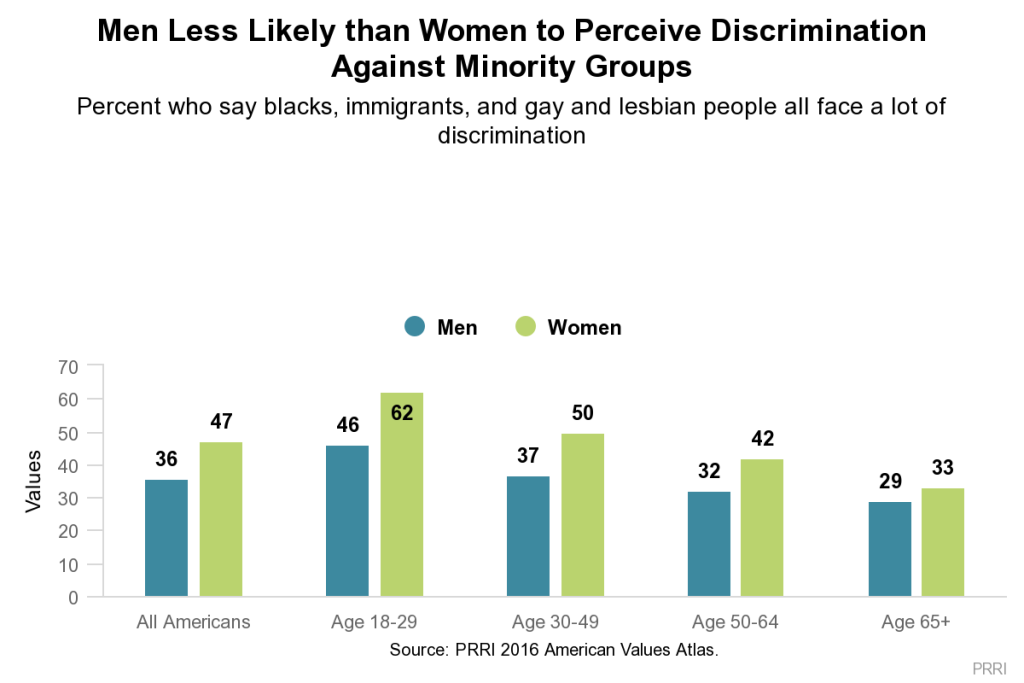 Women are much more likely than men to perceive discrimination across different groups. Nearly half of women (47%) say immigrants, blacks, and gay and lesbian people experience a lot of discrimination, a view held by only 36% of men. Conversely, men are much more likely than women to say none of these groups deal with a lot of discrimination (29% vs. 19%, respectively). However, the gender gap varies across generations. Young women are significantly more likely than young men to perceive discrimination, while the views of older men and women are not appreciably different. More than six in ten (62%) young women say all three groups experience a lot of discrimination, compared to fewer than half (46%) of young men. Senior men and women are about as likely to express a belief that all these groups face a large amount of discrimination (29% vs. 33%, respectively).
Women are much more likely than men to perceive discrimination across different groups. Nearly half of women (47%) say immigrants, blacks, and gay and lesbian people experience a lot of discrimination, a view held by only 36% of men. Conversely, men are much more likely than women to say none of these groups deal with a lot of discrimination (29% vs. 19%, respectively). However, the gender gap varies across generations. Young women are significantly more likely than young men to perceive discrimination, while the views of older men and women are not appreciably different. More than six in ten (62%) young women say all three groups experience a lot of discrimination, compared to fewer than half (46%) of young men. Senior men and women are about as likely to express a belief that all these groups face a large amount of discrimination (29% vs. 33%, respectively).
There are only modest differences in views of Americans by region, but sizable differences between states. Nearly four in ten residents of Montana (39%) and North Dakota (38%), and roughly one-third of Americans living in West Virginia (33%), Maine (33%), Wyoming (33%), and Alaska (32%) believe none of these groups—blacks, immigrants and gay and lesbian people—face a lot of discrimination. In contrast, fewer than one in five Americans living in California (19%), Maryland (19%), New York (18%), Massachusetts (18%), and Rhode Island (13%) say none of the three groups experience a great amount of discrimination. Nearly half of Americans in New York (49%), California (48%), Maryland (47%), Massachusetts (46%), and Rhode Island (46%) say all three experience a lot of discrimination.
II. LGBT Policy
Same-sex Marriage
A Turning Point in Opinion on Same-sex Marriage?
There has been a major shift in attitudes on same-sex marriage since 2015. Roughly six in ten (58%) Americans express support for same-sex marriage today, compared to 53% in 2015, a five-point increase.
Race & Ethnicity
Same-sex marriage garners majority support among Americans of most racial and ethnic backgrounds. Roughly six in ten white (59%), mixed-race (59%), and Hispanic Americans (60%), and close to seven in ten (69%) Asian-Pacific Islander (API) Americans favor same-sex marriage. Black Americans are more divided with fewer than half (48%) expressing support for allowing gay and lesbian couples to marry legally, while 41% are opposed. However, 2016 is the first year in which supporters of same-sex marriage outnumber opponents among black Americans. There are substantial cleavages of opinion among different racial and ethnic groups by generation and by education level.
The influence of education on views of same-sex marriage varies across different racial and ethnic groups. Fewer than half (44%) of black Americans with a high school degree or less support same-sex marriage, compared to nearly six in ten college-educated blacks (57%). Majorities of Hispanics with no more than a high school degree (56%) and those with a four-year degree (67%) favor same-sex marriage. There are profound differences in views of whites by education. Fewer than half (49%) of white Americans with a high school degree or less say they favor same-sex marriage, compared to seven in ten (70%) whites with a four-year degree. Notably, there are virtually no educational differences among Asian Americans, with roughly equal numbers of those with no more than high school degree (67%) and those with at least a four-year degree (71%) expressing support for same-sex marriage.
Among younger Americans there is strong support for same-sex marriage across racial and ethnic groups. Roughly two-thirds of black young adults (65%), three-quarters of Hispanic (75%) and white young adults (75%), and more than eight in ten (81%) API young adults all favor same-sex marriage. By contrast, fewer than half of white (45%), black (37%), and Hispanic seniors (37%) favor same-sex marriage. Even among API Americans, who tend to strongly favor same-sex marriage, only slightly more than half (52%) of seniors favor it.
Political Affiliation
There are enduring differences of opinion between Democrats and Republicans on the issue of same-sex marriage, although Republican opposition appears to be weakening. More than seven in ten (71%) Democrats and roughly six in ten (62%) independents favor same-sex marriage. In contrast, only 38% of Republicans favor same-sex marriage, while a majority (52%) oppose it. One year earlier, nearly six in ten (59%) Republicans said they opposed same-sex marriage.
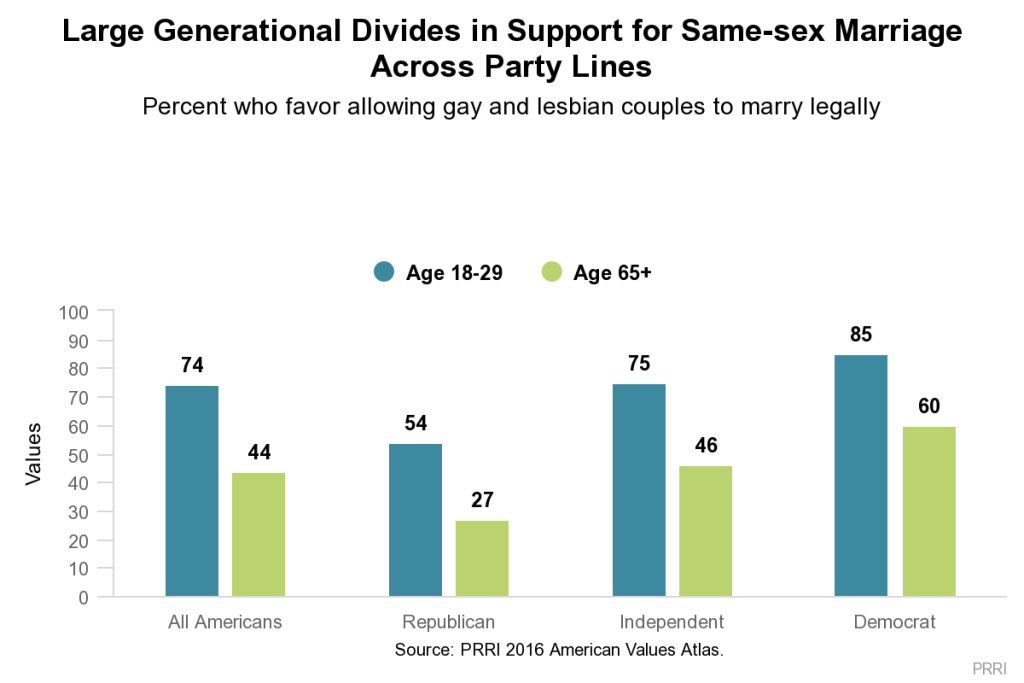 Views among Republicans are fracturing along generational lines. A majority (54%) of young Republicans are in favor of allowing gay and lesbian couples to marry, while fewer than three in ten (27%) Republican seniors agree. More than six in ten (63%) Republican seniors are opposed to same-sex marriage.
Views among Republicans are fracturing along generational lines. A majority (54%) of young Republicans are in favor of allowing gay and lesbian couples to marry, while fewer than three in ten (27%) Republican seniors agree. More than six in ten (63%) Republican seniors are opposed to same-sex marriage.
Among both parties there are dramatic ideological divisions. More than eight in ten (85%) liberal Democrats favor same-sex marriage, a view shared by fewer than half (46%) of conservative Democrats. Similarly, liberal Republicans are nearly twice as likely as conservative Republicans to support same-sex marriage (58% vs. 31%, respectively).
Religious Affiliation
Most religious groups in the U.S. now support same-sex marriage. Among Christians, a majority of white mainline Protestants (63%), Catholics (62%), and Orthodox Christians (59%) favor same-sex marriage. There is no ethnic schism among Catholics on the issue of same-sex marriage—roughly equal numbers of white Catholics (63%) and Hispanic Catholics (62%) express support for the policy. Black Protestants and Hispanic Protestants are more divided. Equal numbers of black Protestants favor (45%) and oppose (45%) same-sex marriage. Similarly, Hispanic Protestants are about as likely to express support for same-sex marriage as oppose it (41% vs. 46%, respectively). Sizable numbers of both black Protestants (11%) and Hispanic Protestants (12%) do not offer any opinion on the issue. There are only three major religious groups among whom a majority oppose same-sex marriage: Jehovah’s Witnesses (53% oppose vs. 25% support), Mormons (55% oppose vs. 37% support), and white evangelical Protestants (61% oppose vs. 31% support).
Support for same-sex marriage is robust among most non-Christian religious groups with the notable exception of Muslims. At least two-thirds of Hindus (67%), Jews (73%), and Buddhists (85%) favor same-sex marriage. In contrast, fewer than half (44%) of Muslims say gay and lesbian people should be allowed to marry, while roughly as many (41%) are opposed. Notably, 16% of Muslims offer no opinion on the issue.
There is robust support for same-sex marriage among the religiously unaffiliated. Nearly eight in ten (78%) unaffiliated Americans—including more than nine in ten atheists (91%) and agnostics (93%)—say they favor allowing gay and lesbian couples to marry. A similar number of Unitarian Universalists (94%) also express support for same-sex marriage.
No religious group is more strongly opposed to same-sex marriage than white evangelical Protestants; however, there is a wide gap between the views of older and younger white evangelicals. For the first time, a slim majority (51%) of young white evangelical Protestants now favor same-sex marriage, more than double the support found among white evangelical seniors (24%). Two-thirds (67%) of white evangelical seniors oppose same-sex marriage.
A similar generational realignment is occurring among Mormons. Nearly half (47%) of Mormons under the age of 30 favor same-sex marriage compared to only 28% of Mormon seniors. More than six in ten (62%) Mormon seniors oppose same-sex marriage.
Religious Change
No religious group has experienced a more dramatic shift in views on same-sex marriage than white mainline Protestants. Currently, 63% of white mainline Protestants support same-sex marriage, a 27-point increase from 2003 when only about one-third (36%) expressed support for the policy. Catholics also witnessed a major reversal in views over this period with fewer than four in ten 35% expressing support for same-sex marriage in 2003.
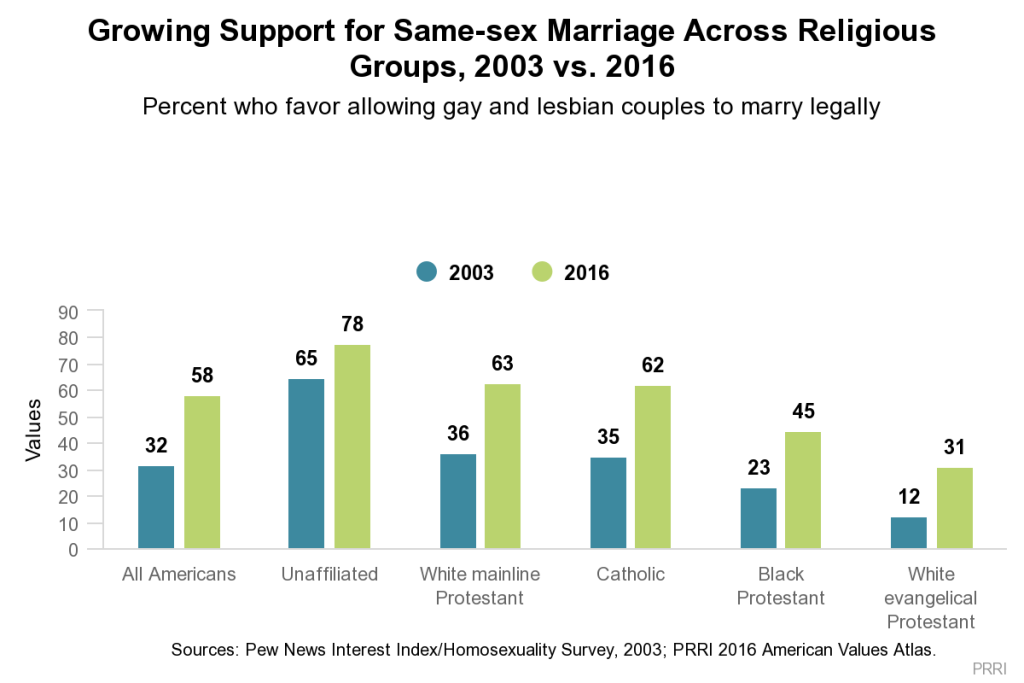 More conservative religious groups demonstrated a notable shift in opinion, as well. The views of white evangelical Protestants increased to 31% from 12% in 2003, while black Protestants saw a 22-point increase in support: 45% today from 23% in 2003.
More conservative religious groups demonstrated a notable shift in opinion, as well. The views of white evangelical Protestants increased to 31% from 12% in 2003, while black Protestants saw a 22-point increase in support: 45% today from 23% in 2003.
LGBT Identity
LGBT Americans overwhelmingly support same-sex marriage. Nearly nine in ten (88%) favor the policy, including more than two-thirds (68%) who strongly support it. Among heterosexual Americans, 56% express support for same-sex marriage.
Geography
In 2014, same-sex marriage garnered majority support in slightly more than half of all states (29 states). Two years later, a majority of residents in 37 states report being in favor of same-sex marriage.
No state is more supportive of same-sex marriage than Massachusetts, although support is strong throughout the New England region. Nearly three-quarters (74%) of Massachusetts residents favor same-sex marriage as do seven in ten residents of New Hampshire (70%) and Connecticut (70%).
With one exception, support for same-sex marriage is lowest across the deep South. Only 37% of Mississippi residents and West Virginia residents say gay and lesbian people should be allowed to marry legally, while roughly four in ten Americans living in Alabama (41%), Arkansas (42%), South Carolina (44%), and Louisiana (44%) say the same. For a complete state-by-state look, visit ava.prri.org.
A Southern Realignment
There is an emerging consensus among young adults on the issue of same-sex marriage that may begin to overshadow existing regional disparities. Overall, Americans living in the Northeast are substantially more likely than those living in the South to favor same-sex marriage (65% vs. 51%, respectively). Close to six in ten (58%) Americans living in the Midwest and more than six in ten (64%) living in the Western United States also support same-sex marriage. However, among Americans under the age of 30 similar numbers of Northeasterners (73%) and Southerners (71%) support same-sex marriage. More than three-quarters of young adults in the Midwest (77%) and West (77%) also favor same-sex marriage.
In part, this shift may be the result of shifting religious demographics in the South. More than one-third (35%) of Southern seniors identify as white evangelical Protestant, compared to only 11% of young adults in the South.
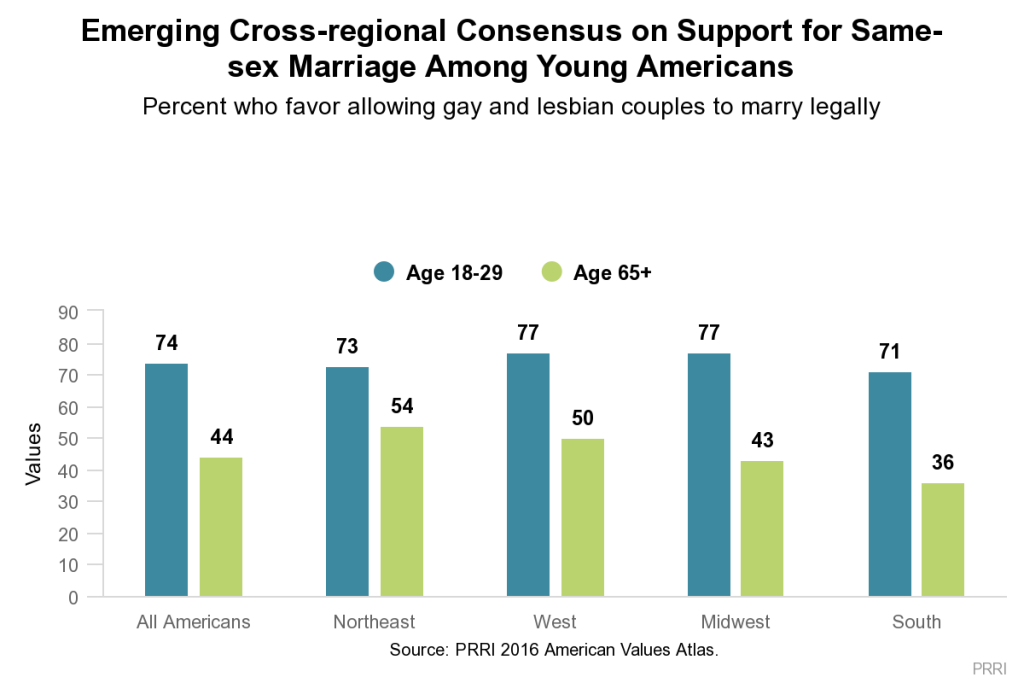 Religiously Based Service Refusals
Religiously Based Service Refusals
More than six in ten (61%) Americans oppose allowing small business owners in their state to refuse to provide products or services to gay or lesbian people, if doing so would violate their religious beliefs. Three in ten (30%) Americans favor allowing small business owners latitude to make these types of decisions. Nearly one in ten (9%) offer no opinion on this issue. Views are largely unchanged from a year earlier when roughly six in ten (59%) Americans expressed opposition to these types of religious exemptions.
Race & Ethnicity
There is an emerging cross-racial and -ethnic consensus in views about whether businesses should be granted religious exemptions to refuse goods or services to gay and lesbian people. Fewer than one-third of white (32%), Hispanic (28%), mixed-race (28%), black (24%), and API Americans (25%) favor a policy that would allow small businesses to operate this way. At least six in ten white (60%), Hispanic (62%), API (65%), and black Americans (68%) express opposition to it.
In 2015, white Americans (55%) were somewhat less likely than Hispanic (66%) and black Americans (67%) to express opposition to service refusals.
Religious Affiliation
There is no religious group in which a majority favors allowing small business owners to refuse services to gay and lesbian people. Only half (50%) of white evangelical Protestants and fewer than half of Mormons (42%), Hispanic Protestants (34%), black Protestants (25%), and Jehovah’s Witnesses (25%) believe small business owners should be granted permission to refuse services to gay and lesbian people. More than four in ten (42%) white evangelical Protestants and a majority of Mormons (52%), Hispanic Protestants (52%), Jehovah’s Witnesses (53%), and black Protestants (66%) oppose a policy allowing small businesses to refuse services to gay and lesbian people. Among other religious groups, opposition is more robust. At least six in ten Muslims (60%), Catholics (62%), white mainline Protestants (62%), Hindus (63%), Jews (72%), religiously unaffiliated Americans (74%), Buddhists (76%), and Unitarian Universalists (87%) oppose allowing small businesses owners to refuse serving gay and lesbian people.
One year earlier, a majority of white evangelical Protestants (56%) and Mormons (58%) said small business owners should be allowed to refuse services or goods to gay and lesbian people if doing so did not accord with their religious beliefs.
Political Affiliation
There are sharp partisan divisions in views about the right of companies to refuse services or goods to gay and lesbian people. Republicans are about three times as likely as Democrats to say small business owners should be allowed to do so (49% vs. 17%, respectively). Independents largely resemble the general public.
In just the last year, Republican support for service refusals has dropped significantly. In 2015, a majority (55%) of Republicans favored allowing small businesses to refuse goods or services to gay and lesbian people if doing so would violate the owners’ religious beliefs. Political independents also experienced a decline in support, while changes among Democrats were more modest.
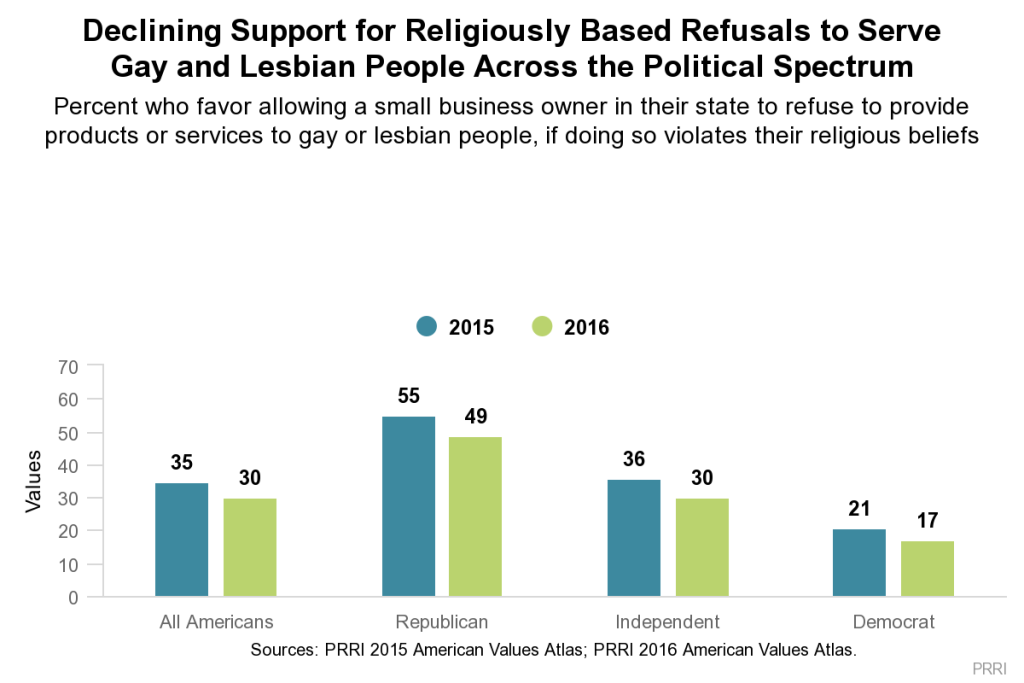 However, there is a critical ideological gap dividing Republicans and, to a lesser extent, Democrats. A majority (56%) of conservative Republicans favor a policy that would allow small business owners the discretion to refuse services, while only about one in three moderate (33%) and liberal Republicans (28%) agree. Roughly six in ten moderate Republicans (59%) and liberal Republicans (63%) say they would be opposed to such a measure. Similarly, conservative Democrats (29%) are more likely than moderate (20%) and liberal Democrats (11%) to support such a policy, although majorities of Democrats across the ideological spectrum express opposition.
However, there is a critical ideological gap dividing Republicans and, to a lesser extent, Democrats. A majority (56%) of conservative Republicans favor a policy that would allow small business owners the discretion to refuse services, while only about one in three moderate (33%) and liberal Republicans (28%) agree. Roughly six in ten moderate Republicans (59%) and liberal Republicans (63%) say they would be opposed to such a measure. Similarly, conservative Democrats (29%) are more likely than moderate (20%) and liberal Democrats (11%) to support such a policy, although majorities of Democrats across the ideological spectrum express opposition.
LGBT Identity
Americans who identify as LGBT strongly reject a policy that would allow business owners to refuse services to gay and lesbian people. More than eight in ten (82%) of LGBT people say business owners should not be allowed to refuse goods or services to gay and lesbian people, if doing so would go against their religious beliefs. Roughly six in ten (61%) straight Americans also oppose this policy.
Geography
A majority of Americans in nearly every state—with the exception of Alaska—oppose allowing small business owners to refuse goods or services to gay and lesbian people. However, the strength of opposition to this policy varies significantly by state. Half (50%) of Americans living in Alaska—and a slim majority of those residing in North Dakota (51%), Alabama (51%), Montana (52%), and Mississippi (52%)—oppose a policy that would permit small businesses to refuse services to gay and lesbian people. Opposition is greater in most other parts of the country. At least seven in ten Americans living in Rhode Island (70%), Delaware (71%), New Hampshire (71%), Connecticut (72%), and Vermont (75%) oppose service refusals. For a complete state-by-state look, visit ava.prri.org.
Even among whites in southern states, a policy that would allow small businesses to refuse services to gay and lesbian people does not receive majority support. Fewer than half (48%) of whites in Mississippi favor this policy while roughly four in ten (41%) oppose it. More than one in ten (11%) express no opinion.
III. Immigration
Immigration Reform
Despite a tumultuous 2016 campaign season that featured heated rhetoric on immigration, American attitudes about immigration reform have remained remarkably stable. Today, nearly two-thirds (64%) of Americans say the immigration system should allow immigrants currently living in the country illegally to become citizens provided they meet certain requirements. Fifteen percent prefer allowing immigrants living in the country illegally to become permanent legal residents but not citizens, and another 16% say these immigrants should be identified and deported. Views on immigration reform policy have remained stable since 2013.
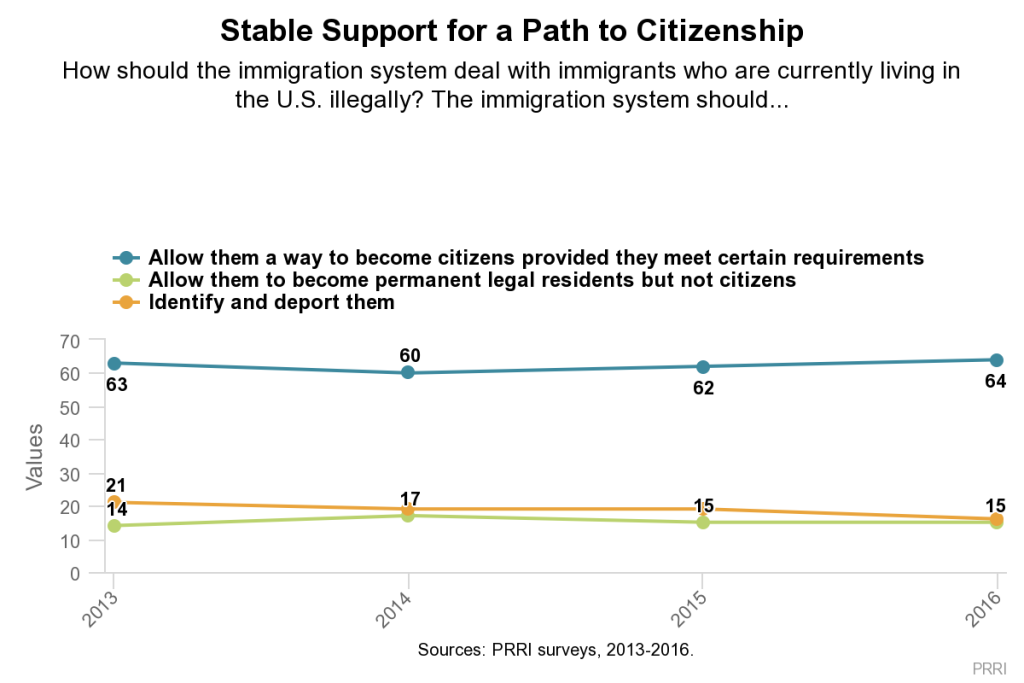 Support for a path to citizenship for immigrants living in the country illegally has ticked up slightly since 2014, when six in ten (60%) Americans said such immigrants should be allowed to become citizens provided they meet certain requirements. At the time, 17% of Americans supported permanent legal residency, and 19% opted for deportation.
Support for a path to citizenship for immigrants living in the country illegally has ticked up slightly since 2014, when six in ten (60%) Americans said such immigrants should be allowed to become citizens provided they meet certain requirements. At the time, 17% of Americans supported permanent legal residency, and 19% opted for deportation.
Age, Race, and Ethnicity
Policy preferences vary somewhat by generation. More than seven in ten (72%) young adults (age 18-29) believe immigrants living in the country illegally should be allowed to become citizens provided they meet certain requirements, while 16% prefer legal residency but not citizenship, and fewer than one in ten (9%) opt for deportation. Among seniors (age 65 or older), about six in ten (62%) support citizenship for such immigrants, 13% are in favor of permanent legal residency, and nearly one in five (19%) prefer deportation.
Racial and ethnic differences on immigration reform policy are relatively modest. Black Americans (72%) report the strongest support for citizenship for illegal immigrants, followed by mixed-race Americans (66%), Hispanic Americans (65%), white Americans (64%), and Asian-Pacific Islander (API) Americans (58%). About one-quarter of Hispanic (25%) and API Americans (24%) say immigrants living in the country illegally should be allowed to become permanent legal residents but not citizens, while fewer black (15%) and white Americans (12%) say the same. Notably, white Americans (20%) are significantly more likely than API (11%), black (9%), and Hispanic Americans (6%) to back the deportation of immigrants living in the country illegally.
There are, however, notable differences of opinion by place of birth among Hispanic Americans. Hispanic Americans born inside the U.S. express stronger support for a path to citizenship for immigrants living in the U.S. illegally than Hispanics born outside the country (74% vs. 58%, respectively), while the reverse is true in support for permanent legal residency (14% vs. 35%, respectively). Very few Hispanics born inside the U.S. (9%) and outside the U.S. (3%) believe immigrants living in the country illegally should be deported.
Politics
Despite the contentious discourse around immigration issues, providing a path to citizenship for immigrants living in the U.S. illegally is the preferred policy of both Democrats and Republicans. However, Democrats express significantly stronger support than Republicans for allowing illegal immigrants to stay in the country legally. Three-quarters (75%) of Democrats say immigrants living in the country illegally should be granted a path to citizenship if they meet certain requirements, while a majority (55%) of Republicans say the same. Permanent legal residency is supported by relatively few Democrats (15%) and Republicans (13%), while deportation is a significantly more popular policy among Republicans (28%) than among Democrats (8%).
Younger Republicans, however, voice stronger support for legal status for illegal immigrants than those who are older. More than six in ten (62%) Republican young adults say immigrants living here illegally should be allowed to become citizens provided they meet certain requirements, compared to a slim majority (53%) of Republican seniors.
Religious Affiliation
Religious divisions on the issue of immigration are notable, with white Christians expressing weaker support for citizenship for immigrants residing in the country illegally than both nonwhite Christians and non-Christians. Nearly nine in ten (86%) Unitarian Universalists and roughly seven in ten black Protestants (73%), Buddhists (71%), and religiously unaffiliated Americans (69%) say immigrants living in the country illegally should be provided with a path to citizenship. This sentiment is echoed by roughly two-thirds of Hispanic Protestants (66%), Hispanic Catholics (64%), and Jewish Americans (64%). About six in ten white mainline Protestants (63%), white Catholics (62%), and white evangelical Protestants (59%) also support citizenship for such immigrants. Notably, white evangelical Protestants (25%) register the highest level of support for the deportation of immigrants living in the U.S. illegally.
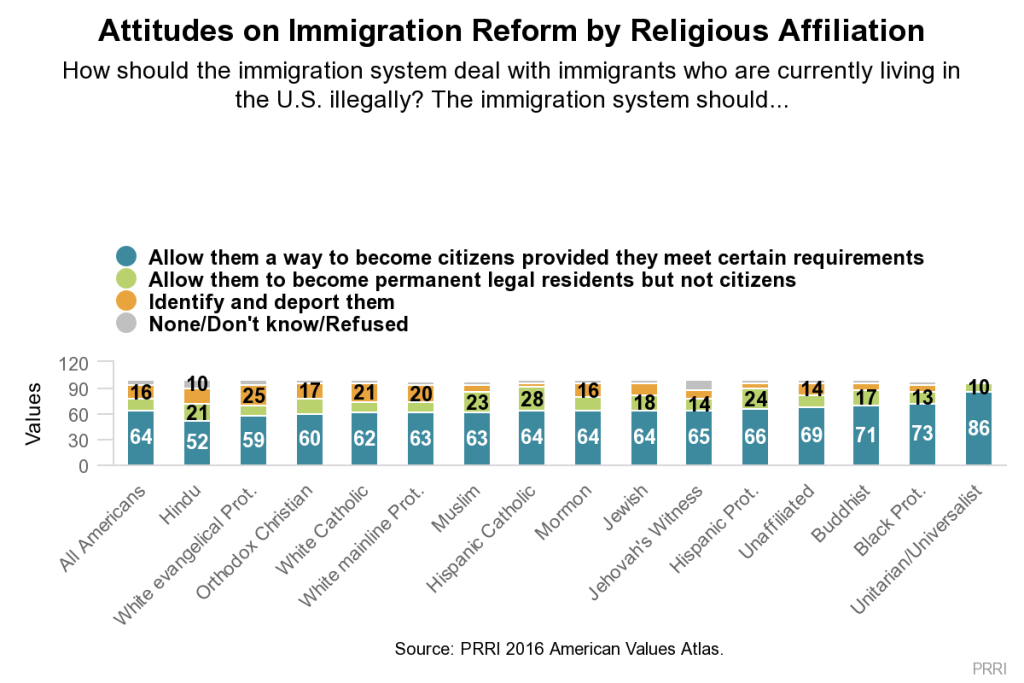 The immigration preferences of white evangelical Protestants are not monolithic, however: Younger white evangelical Protestants are considerably more supportive of giving legal status to illegal immigrants than their older counterparts. While nearly seven in ten (68%) white evangelical young adults say immigrants living in the country illegally should be allowed to become citizens provided they meet certain requirements, fewer than six in ten (58%) white evangelical seniors say the same.
The immigration preferences of white evangelical Protestants are not monolithic, however: Younger white evangelical Protestants are considerably more supportive of giving legal status to illegal immigrants than their older counterparts. While nearly seven in ten (68%) white evangelical young adults say immigrants living in the country illegally should be allowed to become citizens provided they meet certain requirements, fewer than six in ten (58%) white evangelical seniors say the same.
LGBT Identity
Three-quarters (75%) of LGBT Americans and nearly two-thirds (65%) of straight Americans believe immigrants living in the U.S. illegally should be allowed to pursue a path to citizenship provided they met certain requirements. Similar numbers of straight and LGBT Americans support permanent legal residency status (13% vs. 14%, respectively), while straight Americans are somewhat more likely to favor a policy of deportation (17% vs. 10%, respectively).
Geography
Notably, there is virtually no regional difference in immigration policy preference. Roughly two-thirds of residents in the West (66%), Northeast (65%), Midwest (64%), and South (64%) all opt for giving immigrants living in the country legally a path to citizenship.
There are, however, considerable differences between states. More than seven in ten residents of Maryland (74%), Delaware (72%), and Utah (71%) voice support for a path to citizenship for immigrants living in the U.S. illegally. States with the lowest support for a path to citizenship tend to be clustered in the South and Midwest. Nearly six in ten residents of Maine (57%), Mississippi (57%), Missouri (57%), Montana (57%), and West Virginia (57%) favor a policy offering citizenship. Notably, even in Wyoming—the state with the lowest support for a path to citizenship for illegal immigrants—a majority (55%) of residents still support such a policy. Residents of Wyoming (32%) are also the most likely to say illegal immigrants living in the U.S. should be identified and deported.
Endnotes
1 Not all Mormons identify racially as white, non-Hispanic, however the overwhelming majority (83%) do.
2 U.S. Census divisions: New England (Connecticut, Maine, Massachusetts, New Hampshire, Rhode Island, Vermont); Mid-Atlantic (New Jersey, New York, Pennsylvania); East North Central (Illinois, Indiana, Michigan, Ohio, Wisconsin); West North Central: (Iowa, Kansas, Minnesota, Missouri, Nebraska, North Dakota, South Dakota); South Atlantic (Delaware, Florida, Georgia, Maryland, North Carolina, South Carolina, Virginia, West Virginia); East South Central (Alabama, Kentucky, Mississippi, Tennessee); West South Central (Arkansas, Louisiana, Oklahoma, Texas); Mountain (Arizona, Colorado, Idaho, Montana, Nevada, New Mexico, Utah, Wyoming); Pacific (Alaska, California, Hawaii, Oregon, Washington).
3 It is notable that all these states include a much greater proportion of white, non-Hispanic residents than the U.S. overall. More than eight in ten residents of North Dakota (86%), Wyoming (85%), Montana (85%) and South Dakota (83%) are white. Wyoming includes fewer than 100 respondents (N=89) and the results should be interpreted with caution.
4 The Cronbach’s Alpha—a measure of how closely items are related to each other—for these measures is 0.77 indicating that it is appropriate to combine them into a single scale. The transgender question was not included in the scale because it was highly correlated with the question on discrimination against gay and lesbian individuals.
Recommended Citation
Jones, Robert P., Daniel Cox, and Rachel Lienesch. “Who Sees Discrimination? Attitudes on Sexual Orientation, Gender Identity, Race, and Immigration Status | Findings from PRRI’s American Values Atlas.” PRRI. 2017. https://www.prri.org/research/americans-views-discrimination-immigrants-blacks-lgbt-sex-marriage-immigration-reform/
